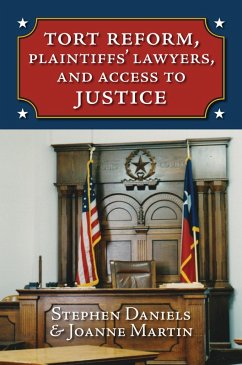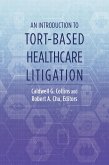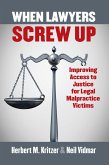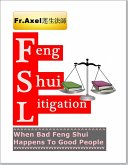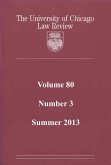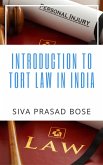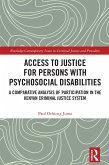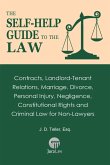Tort reform is a favorite cause for many business leaders and right-leaning politicians, who contend that out-of-control lawsuits throttle growth and inflate costs, particularly in healthcare. Less is said about how such reforms might affect the ability of individuals to recover damages for injuries suffered through another party's negligence. On that count, Texaswhere efforts at tort reform have been energetic and successfulprovides an opportunity to appraise the outcome for plaintiffs and their lawyers, an opportunity that Stephen Daniels and Joanne Martin take full advantage of in this timely and provocative work. Because much of the action on tort reform takes place on the state level, a look at the experience of Texas, a large and important state with a very active plaintiff's bar, is especially instructive.
Plaintiffs' lawyers work on a contingency fee basis, collecting compensation for themselves as a percentage only if they win. Reduce lawyers' ability to use contingency fees as compensation, as tort reform inevitably does, and you reduce their economic incentive to do this work. Daniels and Martin's study bears this out. Drawing on over 20 years of research, extensive surveys and interviews, the authors explore the impact the tort reform movement in Texas has had on the ability of plaintiffs to obtain judgmentsin short on private citizens' meaningful access to the full power of the law. In the course of their analysis, the authors explain the history and economics behind the workings of the plaintiffs' bar. They explore how lawyers select cases and clients, as well as the referral process that moves cases among lawyers and allows for specialization. They also examine the effects of medical malpractice reforms on plaintiffs' lawyersreforms that often close the courthouse doors to certain types of peopletort reform's hidden victims.
Plaintiffs' lawyers are the civil justice system's gatekeepers, providing meaningful access to the rights the law provides. Daniels and Martin's thorough and fair-minded work offers a unique and sobering perspective on how tort reform can curtail this accessand thus, the legal rights of American citizens.
Plaintiffs' lawyers work on a contingency fee basis, collecting compensation for themselves as a percentage only if they win. Reduce lawyers' ability to use contingency fees as compensation, as tort reform inevitably does, and you reduce their economic incentive to do this work. Daniels and Martin's study bears this out. Drawing on over 20 years of research, extensive surveys and interviews, the authors explore the impact the tort reform movement in Texas has had on the ability of plaintiffs to obtain judgmentsin short on private citizens' meaningful access to the full power of the law. In the course of their analysis, the authors explain the history and economics behind the workings of the plaintiffs' bar. They explore how lawyers select cases and clients, as well as the referral process that moves cases among lawyers and allows for specialization. They also examine the effects of medical malpractice reforms on plaintiffs' lawyersreforms that often close the courthouse doors to certain types of peopletort reform's hidden victims.
Plaintiffs' lawyers are the civil justice system's gatekeepers, providing meaningful access to the rights the law provides. Daniels and Martin's thorough and fair-minded work offers a unique and sobering perspective on how tort reform can curtail this accessand thus, the legal rights of American citizens.
Dieser Download kann aus rechtlichen Gründen nur mit Rechnungsadresse in A, D ausgeliefert werden.

